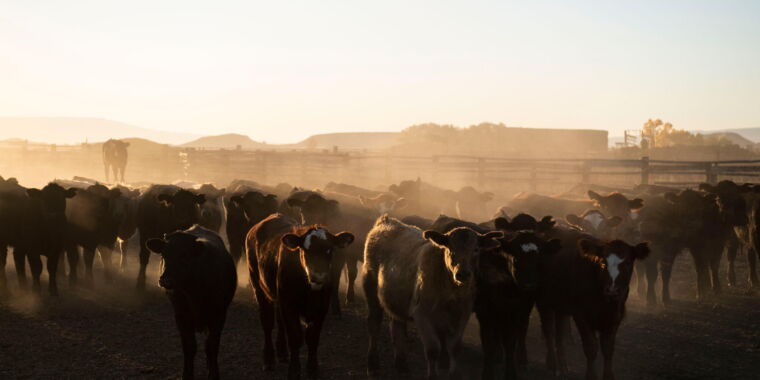[
Carolyn Van Houten/Washington Post via Getty
About five miles south of Broken Bow, in the heart of central Nebraska, thousands of cattle stand in feedlots at Adams Land & Cattle Co., a supplier of beef to the meat giant Tyson Foods.
From the air, the feedlots look dusty brown and packed with cows—not a vision of happy animals grazing on open pastureland, enriching the soil with carbon. But when the animals are slaughtered, processed, and sent onward to consumers, labels on the final product can claim that they were raised in a “climate friendly” way.
In late 2022, Tyson—one of the country’s “big four” meat packers—applied to the US Department of Agriculture (USDA), seeking a “climate friendly” label for its Brazen Beef brand. The production of Brazen Beef, the label claims, achieves a “10 percent greenhouse gas reduction.” Soon after, the USDA approved the label.
Immediately, environmental groups questioned the claim and petitioned the agency to stop using it, citing livestock’s significant greenhouse gas emissions and the growing pile of research that documents them. These groups and journalism outlets, including Inside Climate News, have asked the agency for the data it used to support its rubber-stamping of Tyson’s label but have essentially gotten nowhere.
“There are lots of misleading claims on food, but it’s hard to imagine a claim that’s more misleading than ‘climate friendly’ beef,” said Scott Faber, a senior vice president at the Environmental Working Group (EWG). “It’s like putting a cancer-free label on a cigarette. There’s no worse food choice for the climate than beef.”
The USDA has since confirmed it is currently considering and has approved similar labels for more livestock companies, but would not say which ones.
On Wednesday, the EWG, a longtime watchdog of the USDA, published a new analysis, outlining its efforts over the last year to push the agency for more transparency, including asking it to provide the specific rationale for allowing Brazen Beef to carry the “climate friendly” label. Last year, the group filed a Freedom of Information Act request, seeking the data that Tyson supplied to the agency in support of its application, but received only a heavily redacted response. EWG also petitioned the agency to not allow climate friendly or low carbon claims on beef.
To earn the “climate friendly” label, Tyson requires ranchers to meet the criteria of its internal “Climate-Smart Beef” program, but EWG notes that the company fails to provide information about the practices that farmers are required to adopt or about which farmers participate in the program. The only farm it has publicly identified is the Adams company in Nebraska.
A USDA spokesperson told Inside Climate News it can only rely on a third-party verification company to substantiate a label claim and could not provide the data Tyson submitted for its review.
“Because Congress did not provide USDA with on-farm oversight authority that would enable it to verify these types of labeling claims, companies must use third-party certifying organizations to substantiate these claims,” the spokesperson wrote in an email, directing Inside Climate News to the third-party verifier or Tyson for more information.
The third-party verification company, Where Food Comes From, did not respond to emailed questions from Inside Climate News, and Tyson did not respond to emails seeking comment.
The USDA said it is reviewing EWG’s petitions and announced in June 2023 that it’s working on strengthening the “substantiation of animal-raising claims, which includes the type of claim affixed to the Brazen Beef product.”
The agency said other livestock companies were seeking similar labels and that the agency has approved them, but would not identify those companies, saying Inside Climate News would have to seek the information through a Freedom of Information Act request.
“They’re being incredibly obstinate about sharing anything right now,” said Matthew Hayek, a researcher with New York University who studies the environmental and climate impacts of the food system. “Speaking as a scientist, it’s not transparent and it’s a scandal in its own right that the government can’t provide this information.”
This lack of transparency from the agency worries environmental and legal advocacy groups, especially now that billions of dollars in taxpayer funds are available for agricultural practices deemed to have benefits for the climate. The Biden administration’s signature climate legislation, the Inflation Reduction Act, appropriated nearly $20 billion for these practices; another $3.1 billion is available through a Biden-era program called the Partnership for Climate-Smart Commodities.
“This is an important test case for USDA,” Faber said. “If they can’t say no to a clearly misleading climate claim like ‘climate friendly’ beef, why should they be trusted to say no to other misleading climate claims? There’s a lot of money at stake.”







